
Highlights, insights and trends from IAGR and IMGL Rome 2024 conference
The article was provided with thanks by IAGR partner Greo Evidence Insights.
This year’s IAGR and IMGL conference in Rome was a resounding success, enabling delegates to Navigate the future of gaming in a transforming world with engaging panelists and moderators, captivating keynote speakers, and opportunities to reconnect with and build networks.
It was evident that the IAGR team, led by Ben Haden, put a tremendous amount of care and effort into this landmark event. Italian attendees, including Mario Lollobrigida from the Customs and Monopolies Agency provided a superb stage for meaningful and exciting engagements, whilst his colleagues also provided an informative view into the local picture of gambling in Italy.
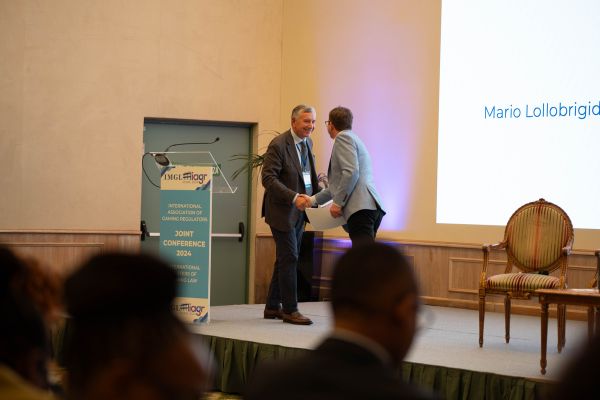
Mario Lollobrigida and Ben Haden opening IAGR2024
Some of the event’s key takeaways included:
- Collaboration between regulators, across regulators and operators, and learning across jurisdictions is essential.
- Lived experience is a valuable lens for all facets of the sector—from regulators to operators, to academics, and the public.
- The gambling industry is increasingly adopting new technologies and AI, generating large amounts of player data, and there are implications for regulatory approaches.
- New approaches to gambling advertising and marketing are finding the edges of public trust.
- Layered and evidence-based solutions are needed for evolving gambling products and environments to reduce harm and strengthen player well-being.
Cutting across all themes was dialogue about the challenges of reconciling diverse interests and perspectives, making for some exciting conversations.
Here are some of the things we learned.
Collaboration between regulators, across regulators and operators, and learning across jurisdictions is essential.
“Collaboration can be tough, but it’s essential.” – Andrew Rhodes
Andrew Rhodes, Chief Executive of the Gambling Commission, Great Britain, spoke about the future of gambling in a digital age. A key takeaway from his speech was the importance of collaboration between regulators. Whether on measures relating to data sharing, player protection, or illegal gambling activities, in a globalized gambling industry, cooperation allows regulators to grapple with challenges more efficiently. In particular, data sharing has been identified as a potential strategy to help prevent, identify, and address gambling-related harm.
Despite the complexities of the global variation in the gambling sector stakeholder ecosystem, opportunities to work better together really exist in 2024 as discussed by an esteemed panel providing insights from Julian Harris of Harris Hagan in the United Kingdom, Atle Hamar of the Norwegian Gambling and Foundation Authority in Norway, Kevin Mullally of the General Commercial Gaming Regulatory Authority in the United Arab Emirates and James Maida from Gaming Laboratories International in the United States.
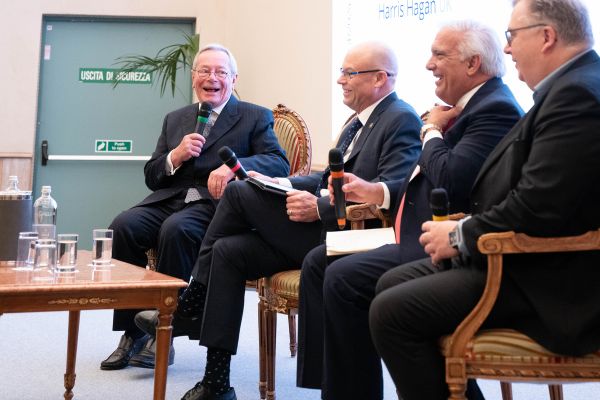
Panel with Julian Harris, Kevin Mullally, James Maida and Atle Hamar
Reuben Portanier of GTG in Malta moderated a discussion exploring the complex world of mergers and acquisitions and how M&A also benefits from collaboration between regulators and operators as they navigate challenges from acquisitions or public listing processes with insights from Anton Kaszubowski of SBC Advisory Partners in the United Kingdom, Andrea Marchetti of Tonucci & Partners in Italy, David Yatom of Soft2Bet in Cyprus, and David Zeffman of CMS in the United Kingdom.
Working collaboratively to learn from others across jurisdictions was also shared as crucial to building and delivering a robust regulatory approach and being better able to navigate disruptions when they occur. Lessons from around the world provided a variety of case studies and practice-based experiences to learn from, including those from Paul Newson of Vanguard Overwatch in Australia, Sonia Wasowska of General Commercial Gaming Regulatory Authority in the United Arab Emirates, Peter Kesitilwe of the Botswana Gambling Authority in Botswana, and Anna Harry of the Casino Gaming Commission in Jamaica.
Additionally, two panels touched on the importance of collaborative prevention and enforcement insights related to illegal gambling across jurisdictions, including sports betting and sports integrity. Bashir Are from the Lagos State Lotteries and Gaming Authority in Nigeria and the IAGR working group, as well as Ludovico Calvi of United Lotteries for Integrity in Sports, Cristian Radu of Superbet, Dr Eugenia Chidhakwa of the Lotteries and Gaming Board in Zimbabwe, Yanica Sant from evoke in Malta generated informative discussions with moderation from Cosmina Simion of WH Simion & Partners in Romania and Ian Angus of the Gambling Commission in Great Britain.
Lived experience is a valuable lens for all facets of the sector—from regulators to operators, to academics, and the public
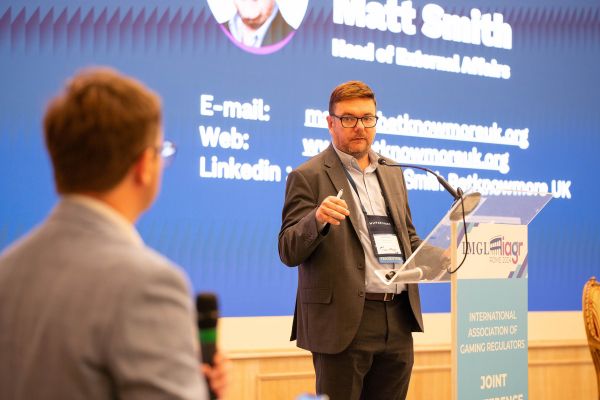
Matt Smith from Betknowmore
Several sessions looked at how the perspectives of those with lived experience, including those who have or are experiencing gambling-related harms, could help inform measures at the regulatory level. Matt Smith from Betknowmore UK shared his story of overcoming gambling addiction and discussed the importance of using the voices of those with lived experience to inform regulatory action.
Matthew Anderson from the Australian Communications and Media Authority (ACMA) shared insights on BetStop, Australia’s National Self-Exclusion Register, emphasizing the lived experience of the user.
“Talk to your users. You really need to understand the experience and journeys they’ve been on to best target a solution that works for them.” – Matthew Anderson
New approaches to gambling advertising and marketing are finding the edges of public trust
An important conversation was moderated by Peter Czegledy of Aird & Berlis LLP on the topic of new forms of gambling marketing and advertising that use social influencers, celebrities, entertainers, athletes and others. Panelists discussed striking a balance between competitive differentiation and public trust regarding the use of new media spokespersons. Insights on this highly anticipated topic were provided by Nina Henningsen of Mazanti-Andersen in Denmark, David Phillips of the Alcohol and Gaming Commission of Ontario in Canada, Tomás Paiva Rosado of Clever Advertising in Portugal, Maria McDonald of Nordic Gambling in Sweden, and Luiz Felipe Maia, of MAIA YOSHIYASU Advogados in Brazil.
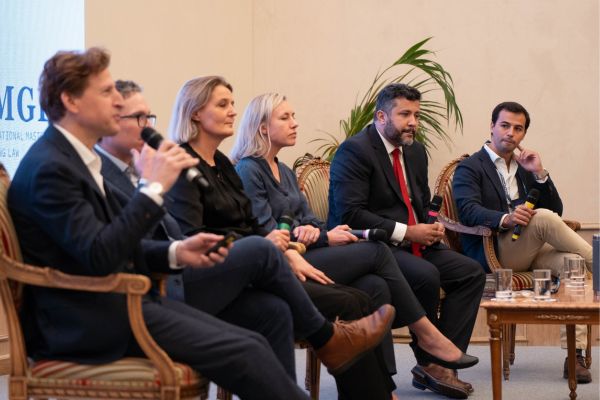
Panel with Peter Czegledy, David Phillips, Nina Henningsen, Maria McDonald, Luiz Felipe Maia and Tomás Paiva Rosado
The lack of standardized restrictions on advertising and promotion for licensing decision-making in the gaming space was also discussed, touching on the reforms underway in Ireland and differing approaches across EU jurisdictions shared by Patricia Lalanda of Loyra Abogados in Spain, Luis Portela de Carvalho of Lektou in Portugal, Ian Angus, Director of Policy, Gambling Commission, United Kingdom, and Rawa Kafta from Wiggin in the United Kingdom.
The gambling industry is increasingly adopting new technologies and AI, generating large amounts of player data, and there are implications for regulatory approaches
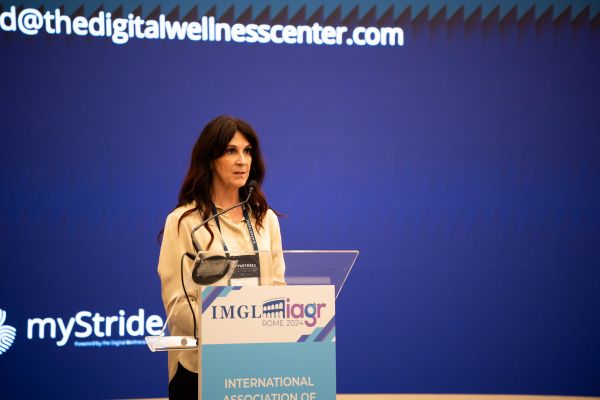
Dr Mary Donohue from The Digital Wellness Centre
The conference featured several thought-provoking discussions on artificial intelligence (AI) and machine learning, and its increased use in the gambling industry. In her session, Dr Maris Catania spoke about the ethical use of AI in the gambling sector, and Dr Mary Donohue of The Digital Wellness Centre shared groundbreaking insights on how AI can help make gambling a safer experience for players, for example, using AI to detect the moment when players’ stress levels spike and offering a microbreak to help regulate emotions.
There was also a captivating panel discussion, moderated by Simo Dragicevic of The Game Safety Institute in the United Kingdom on whether gambling regulators are prepared to regulate an increasingly AI-driven industry with panellists Mark Pace of IGSA & GSA Europe, Dr Ian Gauci of GTG in Malta, Sukriti Verma of the Department for Culture Media and Sport in the United Kingdom recognizing the need to strike a balance between risk and opportunities.
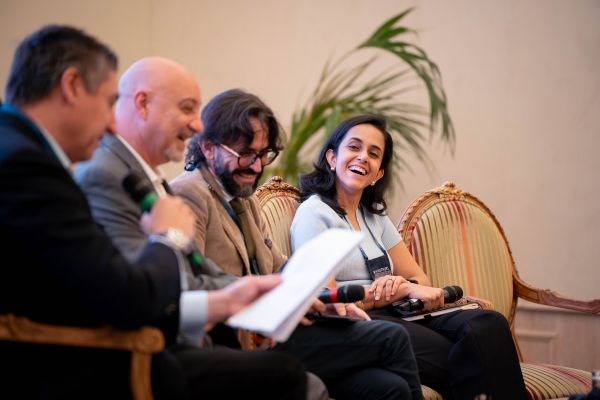
Panel with Simo Dragicevic, Mark Pace, Dr Ian Gauci and Sukriti Verma
Layered and evidence-based solutions are needed for evolving gambling products and environments to reduce harm and strengthen player well-being
Considerations for how regulators should respond to emerging safety concerns with gambling products, programs, and environments that support player health were shared by Simo Dragicevic of The Game Safety Institute in the United Kingdom and Dr. Mary Donohue of The Digital Wellness Center, Canada. Streamlined and layered self-exclusion successes and best practices from Australia, Great Britain and Slovakia were shared by Matthew Anderson of the Australian Communications and Media Authority and Matt Zarb-Cousin of Gamban as well as Dr Margaret Carran, University of London, United Kingdom and Simon Vincze of Casino Guru in Slovakia.
Supporting the shift from “burdensome compliance” to “successful commitment” in player protections and safer gambling conditions, including the use of RG success stories, was explored by Francesco Rodano of Playtech in the United Kingdom, Tracy Parker of the Responsible Gambling Council in Canada, Taina Grech from Kindred Group of Malta, Ryan McCarthy of the British Columbia Lottery Corporation in Canada in a panel moderated by Reuben Portanier of GTG in Malta.

The morning following a wonderful gala event, Dr. Tony Schellinck of Focal Researrch Consultants in Canada shared his insights on the Use of Player Data to Support Safer Gambling before moving into a panel discussion on Responsible Gambling Programs and the Use of Player Data moderated by Greo Evidence Insight’s Chief Strategy Officer, Elizabeth Lusk. Panelists Rasmus Kjaergaard, CEO, Mindway AI in Denmark and Dr. Tony Schellinck highlighted their experience bringing together insights from player data, machine learning models, and expert oversight and the tension between new insights and current regulatory “rule sets”, signaled by Jochen Biewer, Managing Director, Chevron Group, Germany. Kasper Frandsen, Chief Adviser, Danish Gambling Authority also shared how the regulator is focusing on educating the public. Panelists also recognized there remains a gap between the identification of harm amongst players and signposting them to community support.
Discussions about evidence and innovative approaches also included examples of ethically navigating the financial support required to advance evidence-based knowledge in the interest of public health, with Bonnie Andrews from the Massachusetts Gaming Commission providing first-hand experience from the United States.
Finally, the potential role of cashless payments in mitigating possible harms from gaming, as informed by data available to operators was discussed as a potential evidence-based solution to strengthen player well-being. Jennifer Carleton of Sightline Payments in the United States moderated this discussion with insight provided by Giorgi Tsamalaidze of Random Systems Georgia in Georgia, Megan Basson of the International Center for Gaming Regulation in the United States and Raffaele Gnazzi of Novomatic Italia in Italy.
Thank you and looking ahead
The conference closed out with an afternoon of IMGL panel sessions which included valuable conversations that explored the state of play of crypto casinos, cybersecurity, and Bill 55 and its impact on international iGaming regulations. Thank you to the speakers, panelists, moderators across IAGR and IMGL and the fantastic hosts of the social events that were enjoyed by all!
After a record setting IAGR 2024 we’re looking forward to another year of innovative ideas and electric energy at IAGR 2025 in Toronto, Canada next October.
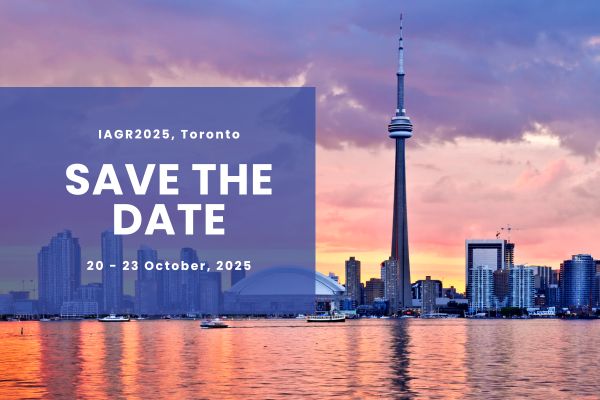
Conference photography by Elena Consoli





